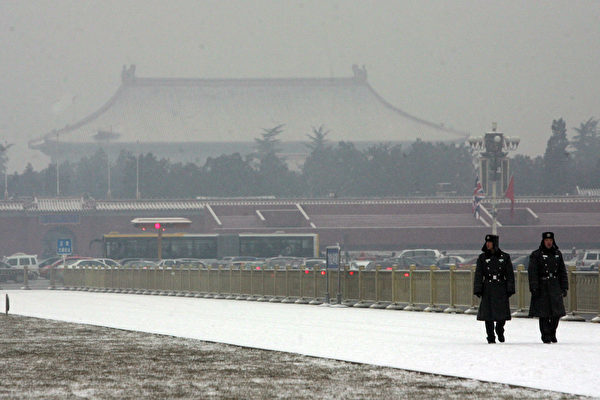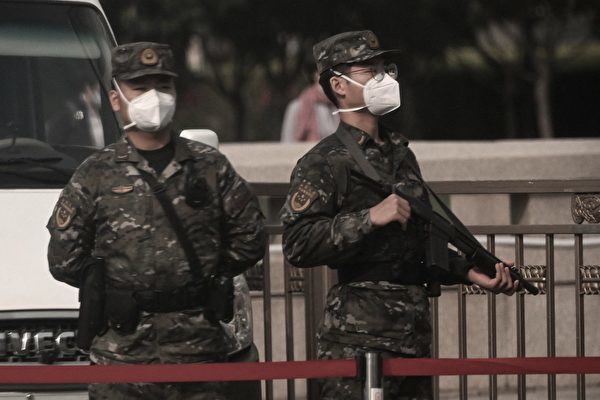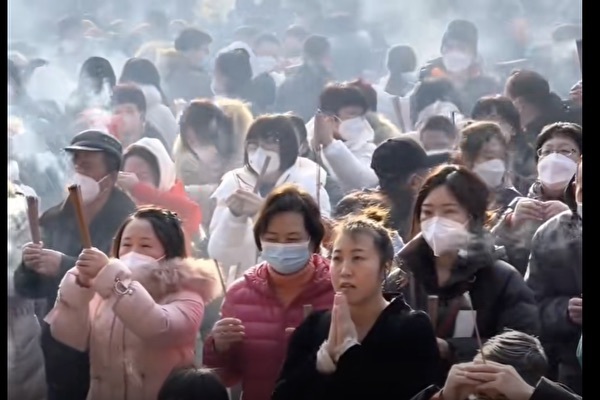On July 11, 2023, in Washington, Marco Rubio speaks at a press conference at the U.S. Capitol. (Madalina Vasiliu/Dajiyuan)
[People News] The Senate unanimously confirmed Florida Senator Marco Rubio as the 72nd U.S. Secretary of State on Monday, making him the first member of President Trump's cabinet to be appointed on his inauguration day.
According to Radio Free Asia, Rubio’s confirmation vote passed with overwhelming bipartisan support, with a count of 99 to 0. Rubio himself cast a vote in favor of his own appointment.
Marco Rubio, who has been sanctioned twice by the CCP, once again showcased his tough stance against China during his confirmation hearing last week. However, the Chinese Foreign Ministry toned down its earlier "wolf warrior diplomacy" rhetoric and quietly changed the translation of Rubio’s name from "Lú Biǎo" (盧比奧) to a new version, "Lǔ Biǎo" (魯比奧). Former diplomats speculate that this move might be an attempt by the CCP to sidestep the sanctions on "Lú Biǎo," but political commentators believe the CCP’s "weakening posture" will not fool American politicians.
Last Wednesday (15th), Marco Rubio, the nominee for the U.S. Secretary of State position, condemned the CCP during a confirmation hearing before the Senate Foreign Relations Committee. He accused the CCP of achieving global superpower status through lying, cheating, hacking, and theft. He warned that if the U.S. does not shift its policies, the CCP will remain the greatest threat to American prosperity in the 21st century. Rubio also cautioned Beijing against making reckless and irrational moves on the Taiwan issue.
On Thursday (16th), during the Chinese Foreign Ministry's routine press conference, a journalist from Agence France-Presse (AFP) questioned Rubio’s strong statements. The transcript of that day’s press conference, published on the Chinese Foreign Ministry’s official website, referred to the U.S. Secretary of State nominee as "Lǔ Biǎo" (魯比奧). Previously, the Chinese Foreign Ministry and state media had consistently used the name "Lú Biǎo" (盧比奧).
Rubio Sanctioned Twice by the CCP
As a leading figure in the U.S. hardline stance on China, Rubio has been labeled by the CCP as a "vanguard of anti-China rhetoric." Due to his condemnation of the CCP’s suppression of Uyghurs and Hong Kong citizens, he has been sanctioned twice.
The first sanction occurred in July 2020 after the U.S. imposed sanctions on four Chinese officials for their atrocities against Uyghurs. In response, the CCP announced sanctions on three U.S. lawmakers, including Rubio.
The second sanction took place in August 2020 after the U.S. State and Treasury Departments sanctioned 11 Chinese and Hong Kong officials for undermining Hong Kong’s autonomy. Then-CCP Foreign Ministry spokesperson Zhao Lijian accused the U.S. of "openly interfering in Hong Kong affairs and rudely meddling in China’s internal affairs" and announced sanctions against Rubio and ten other U.S. lawmakers, scholars, and human rights organization leaders.
In both sanction incidents, CCP state media, including Xinhua News Agency, widely reported on the events, consistently using the name "Lú Biǎo" (盧比奧). However, the official transcripts of the Chinese Foreign Ministry’s press briefings on July 13 and August 10, 2020, have retroactively replaced "Lú Biǎo" (盧比奧) with "Lǔ Biǎo" (魯比奧).
Netizens Mock: Changing the Name Allows Him to Visit
The CCP’s discreet move to change the translation of Marco Rubio's name has sparked heated online discussions. Jia Jia, a writer and senior journalist residing in Japan, commented on platform X, "The Secretary of State nominee Marco Rubio has been officially renamed as 'Lǔ Biǎo' (魯比奧). As the saying goes, there’s no turning back once the bow is drawn. The sanctions list won't be retracted, but the name can be changed—after which, he can come over."
As early as November 12 last year, the day after Rubio was nominated for Secretary of State by Trump, many netizens predicted that the CCP and state media might use a name change as a way to backtrack. On November 13, CCP-affiliated media Reference News (参考消息) was the first to change "Lú Biǎo" (盧比奧) to "Lǔ Biǎo" (魯比奧).
At that time, netizens jokingly remarked: "The CCP government has already figured out a solution—change Marco Rubio's name. That way, the future U.S. Secretary of State and the sanctioned U.S. senator will not be the same person." "We sanctioned Lú Biǎo, not Lǔ Biǎo." "Lú Biǎo is the past; now he’s respectfully called Lǔ Biǎo."
Commentary: Name Change as a Loophole for Early Sanctions
Chen Yonglin, a former political consul at the Chinese Consulate in Sydney and member of the Australian Values Alliance, told this publication that the CCP's Foreign Ministry Translation Office and Xinhua News Agency's translation division have highly standardized and regulated practices for translating foreign political figures' names. The change in the official translation indicates that this decision was made after internal discussions, likely as a way to mitigate or sidestep the earlier sanctions.
Chen said: "The translation of important figures’ names is determined by the Foreign Ministry’s translation office and Xinhua News Agency's naming department. Clearly, there was internal debate about this name, and a decision was made. Bureaucrats, in order to save the CCP's face, decided that the previous sanctions applied to 'Lú Biǎo,' while this 'Lǔ Biǎo' is the Secretary of State—making it clear the two are not the same. The CCP never admits fault. By using 'Lǔ Biǎo,' they are giving themselves an out, though it’s actually unnecessary."
British-Chinese writer Ma Jian, newly elected president of the Independent Chinese PEN Center, criticized the CCP for playing its usual "word games."
Ma said: "I think such name changes are very normal for the CCP—a simple word game. It’s also a common practice within the Foreign Ministry, a way to compromise. If you hate him so much and have sanctioned him, how do you reconcile this? The only retreat is through such methods."
Commentary: The CCP’s “Weakness” Won’t Fool U.S. Politicians
Chen Yonglin also suggested that this move reflects the CCP’s internal and external challenges, showing a softened posture toward the new U.S. administration. However, Rubio and other newly appointed officials are already aware of the CCP's antagonistic stance against global democracies.
Chen said: "The CCP is now struggling internally and externally, returning to a softer approach. Rubio is undoubtedly very hostile to the CCP. While the CCP government may outwardly appear to seek reconciliation, I doubt Rubio will fall for it. In recent years, Western countries, particularly the U.S., have reflected deeply and recognized the CCP as the enemy of global democracies."
Ma Jian further pointed out that while the CCP may appear to weaken, its intent to oppose democracy remains unchanged. He urged American politicians like Rubio to approach U.S.-China policy with greater foresight.
Ma said: "The Communist Party has never admitted defeat—it will fight to the bitter end. There’s no room for compromise here. However, given the domestic challenges with China’s economy and public unrest, maintaining a low point in U.S.-China relations would severely impact the CCP. It’s trying to save face at this moment. I hope younger U.S. politicians will have greater foresight."
Marco Rubio Entered Senate in 2011 and Has Long Focused on Human Rights in China and Hong Kong
Marco Rubio, now 53 years old, entered the U.S. Senate in 2011. In the previous session of Congress, he served as vice chairman of the Senate Intelligence Committee, and was also a member of the Senate Foreign Relations Committee and the Appropriations Committee.
Rubio also co-chaired the U.S. Congressional-Executive Commission on China (CECC). As a senior member of this body, he proposed several legislative measures aimed at countering the Chinese Communist Party (CCP), including efforts to address issues like intellectual property theft, the suppression of Hong Kong, the genocide of Uyghurs, and CCP’s cross-border repression.
During his confirmation hearing last Wednesday, he also emphasized that the U.S. must have clear boundaries when dealing with the CCP, as this is beneficial to America's national interests.










News magazine bootstrap themes!
I like this themes, fast loading and look profesional
Thank you Carlos!
You're welcome!
Please support me with give positive rating!
Yes Sure!